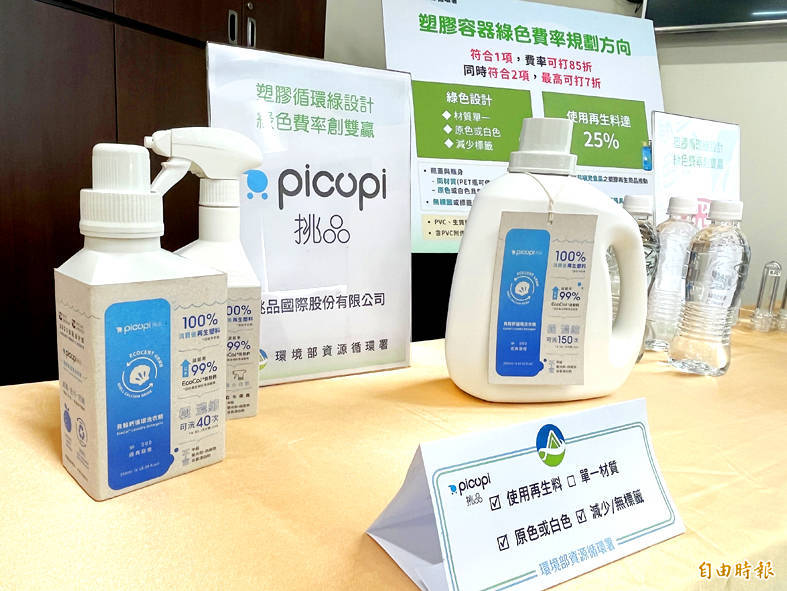《TAIPEI TIMES》 Recycling fees for plastic products to be subsidized

Plastic containers made from recycled materials are displayed at an event held by the Ministry of Environment in Taipei on Thursday. Photo: Chen Chia-yi, Taipei Times
CRITERIA: Products made with at least 25% recycled materials, as well as those made from a single material, with no added coloring and limited labeling, are eligible
By Chen Chia-yi and Jason Pan / Staff reporters
Collection fees are to be subsidized for plastics that conform to environmental standards, as well as those made from at least 25 percent recycled materials, to encourage the use of environmentally friendly packaging, the Ministry of Environment said on Thursday.
The Resource Circulation Administration said in a news release that the new policy would benefit about 15,000 companies.
The policy would promote the use of plastic containers that conform to its Green Design standards, which are that the container is made from a single material, has no added coloring and has limited labeling, Resource Circulation Administration Director-General Lai Ying-ying (賴瑩瑩) said.
In addition, products are eligible for a “green differential fee rate” if they are made of at least 25 percent recycled materials, Lai added.
“Taiwan’s waste recycling sector is built upon the concept of extended producer responsibility,” Lai said. “The ministry’s agencies collect recycling and clean-up treatment fees at the source, whether that be a manufacturer or an importer.”
“The fees — which vary depending on the materials in a product — go into a fund to manage the circulation and recycling of resources, with a portion subsidizing the wages of trash collectors, and enterprises that process or recycle waste,” she said.
Lai said that in November last year, her agency released the Operation Guidelines for Promoting Recycled Plastic Products for Non-Food Packaging, which encourages industries to use more recycled materials.
Thursday’s announcement was to outline the financial incentives of recycling plastic containers, she added.
The policy encourages producers by offering a 15 percent discount on the fees — which are partly based on how much of a category of waste is collected — if their products meet the Green Design criteria, she said.
They are also eligible for the 15 percent subsidy if at least 25 percent of the product is made from recycled materials, she said, adding that if the product meets both criteria, the discount would be 30 percent.
Fees are NT$7 to NT$10 per kilogram of product category that a firm makes or imports, Resource Circulation Administration deputy head Wang Yueh-bin (王嶽斌) said.
A product that is eligible for the 30 percent subsidy would save a company NT$2,000 for every tonne that is collected, Wang said.
About 15,000 firms would benefit from the new policy, he said.
“Agency data indicate that the policy would boost the use of recycled materials by 240,000 tonnes by 2025, which would reduce carbon emissions by 480,000 tonnes per year,” he said.
Hsinchu County-based Kao (Taiwan) Co, a supplier of cleaning products, said that its plastic containers are 30 to 100 percent recycled materials.
However, its environmental efforts have increased production costs by 20 to 30 percent, said Wu Meng-chuan (吳孟娟), who heads the company’s purchasing department.
“The new Ministry of Environment policy on use of recycled materials is a financial incentive for producers and would attract more companies to join the effort,” Wu said.
This would expand the market for recycled materials in Taiwan,” Wu said.
Most containers are made from thermosetting polymers, said Hsu Juei-hsiang (許祥瑞), a section manager at the Taichung-based Plastics Industry Development Center.
Thermosets are made by irreversibly hardening a prepolymer.
“Thermoset products are recyclable, but when they are printed on or use multiple materials, the recycling costs are higher,” Hsu said.
“Producers must consider how containers they design would be recycled,” he said. “That is necessary to maintain a circular economy.”
The Ministry of Health and Welfare has set standards for recycled materials in plastic food containers, as the next policy phase is to encourage people to be more accepting of containers and other products with high recycled material content, he added.
新聞來源:TAIPEI TIMES
















